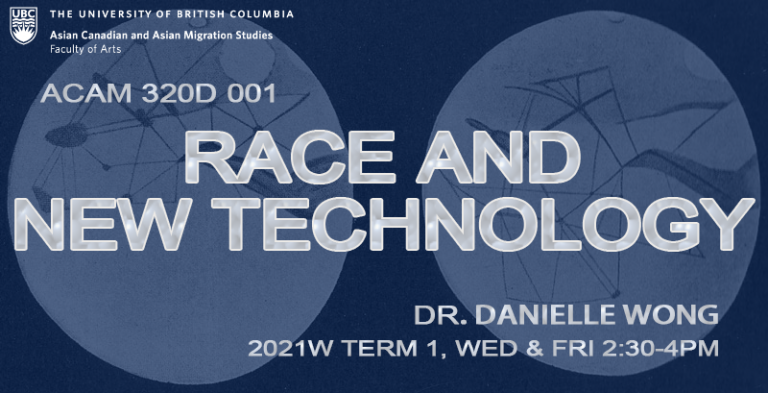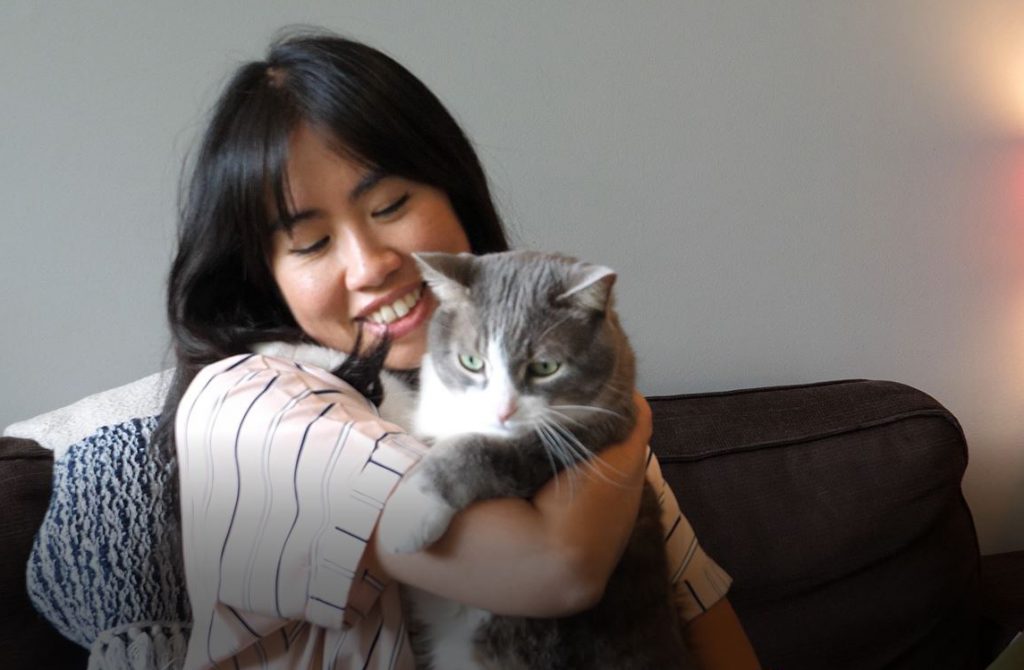To promote our upcoming course ACAM 320D – Race and New Technology, we interviewed Dr. Danielle Wong who will be teaching it this upcoming fall! Learn more about Danielle and her thoughts behind the course here.

How did you arrive at your current teaching and research interests?
My entrance into research and writing was first through journalism. I was hired as a reporter by a newspaper in Ontario after I graduated from the journalism program at Toronto Metropolitan University (formerly Ryerson University). Because I was the only reporter of colour at the newsroom when they hired me, I ended up being tasked with covering what’s called the “diversity beat.” Even without the language for navigating why I was frustrated with this, I was immediately aware of my limitations and frustrations under that framework of diversity. The way that I was being asked to cover certain stories was either through a celebratory liberal multicultural lens or a very uncritical take that didn’t grapple with the underlying foundational racial violence of the nation-state, settler colonialism, or imperialism. I didn’t have certain tools to work with as a reporter and I really wanted to navigate the complexities of those stories. So I ended up going back to school. I did my MA in the English and Cultural Studies Program at McMaster while I was still working, and eventually just felt like that part of research and writing was more suited for me. I did my PhD, after which I worked as a postdoctoral associate in the Asian American Studies Program at Cornell University. These were all very formative experiences that ultimately led me here right now to UBC and that have also affected the ways I approach the so-called “event.” I am interested in the “event,” which is a very journalistic way of understanding crisis or what is contemporary, but I think about the event–whether we are referring to the local, national, or global–as entrenched in past, present, and future temporalities of Empire.
I would say my intellectual questions around technology were already there, kind of brewing when I worked as a reporter. When I graduated from journalism school, Ryerson still had a print journalism stream. But by the time I got a job at a newspaper, I was basically working as a multimedia journalist. I was asked to navigate and handle the newspaper’s Twitter account and website – I was doing online reporting, some videos, tweeting as journalism. What that experience surfaced for me was the shifting questions around mediums and mediation, so-called “new technologies,” and what it means to use those technologies to produce stories that help us navigate, or don’t help us navigate, power structures. And the question of the self as well–what it means to perform a “self” online. And performance is complex, right? It could be really, in some ways, subversive or mischievious, in ways that question, for instance, surveillance systems or the way our patterns and behaviours online are collected as data. So, I would say that my early experiences as a junior reporter were what prompted me to think about the role of social media and racial performance.
What unique avenues and potentials do courses in ACAM provide students with? What makes it different to teach this course in ACAM?
Teaching in ACAM is really exciting to me because the fields that are encompassed by the banner of ACAM foreground the political conditions and the material histories in which knowledge production happens. And because of the interdisciplinary nature of the program, it’s really special to have students from different disciplines and different programs come together in a classroom where they all bring their own perspectives and expertise about particular objects and topics. For instance, sometimes I assign a novel for a course, and a computer science student will come in and approach the questions that I’m asking about the novel in a way that’s really helpful and generative for an English student. And because ACAM, in its very formation, is an acknowledgment of the political nature of learning and producing knowledge, I find students usually come in ready to have those discussions, and based on that premise, there’s also a reflexive nature in which we are thinking about our contexts and the conditions of our discussion and learning.
What do you hope students will take away from this course?
I hope the students will come away with an expansive idea of the term “technology” as a way to enter into a set of questions. Questions that include: what is the relationship between Asian North Americans or Asian diasporic folks, and capitalism, and in particular, information capitalism? What emerges when we follow transnational or diasporic networks, whether they be analog connections or digital ones? And how can we conceive of the role of Asian labour in producing new media productions, new media technologies, as well as new media performances? And lastly, how does thinking about Asian labour help us make connections between new media and histories of migration, displacement, and nation-building?
You are interested in racial capitalism and labour. How does this course consider different iterations of the figure of the ‘Asian labourer’?
One of the course objectives is to historicize and link genealogies of settler colonialism and the inheritances of Empire through the question of technology, as well as to think through not just present day definitions, but ongoing historical concepts of high and low tech labor and how these categories of labor are racialized. So, for instance, we can think about the discourses that are used to describe “Asian coolies” in the Americas alongside discourses that are used to describe machine-like workers with high tolerances of pain. And this is, of course, contrasted as a kind of racial barrier (Lisa Lowe’s wording) between the white worker and enslaved Black labour. So, there’s a way in which we can link these concepts around low tech labor and histories of racial capitalism, to the ways in which, under information capitalism, there seems to be this tension between the Asian influencer or the creative who is touted as a success story–a kind of neoliberal success story–and the low-waged, low-tech worker. This narrative supports an idea that you can basically use your own tools, your own phone, or your own editing skills, and, you know, be the enterprising individual.
To extend the hierarchies of low and high tech labour, and think beyond the figure of the “coolie” also means to grapple with success stories, so-called success stories of capitalism. In particular, a figure like the Asian creative, or the Asian North American influencer, or social media producer, is one that apparently tells us the success story of doing it yourself, of using your skills, your iPhone, the products you’ve bought, to make it. But in this course, we’re going to engage scholarship and histories and different kinds of visual cultures to really interrogate that to think about how even this kind of production of social media performance involves forms of unwaged labor, exploitive work, and how it is racialized. It’s not to equate the historical figure of the coolie with the influencer or even the iPhone factory worker, but it is to put them in tension and in conversation, to think about how ongoing projects of Empire and settler colonialism continue to race work. And in that way, this helps us interrogate the ‘success’ stories that we’re being asked to subscribe to.

Dr. Danielle Wong and her cat Marty, who made a guest appearance in ACAM320D’s course trailer
 Faculty of Art
Faculty of Art